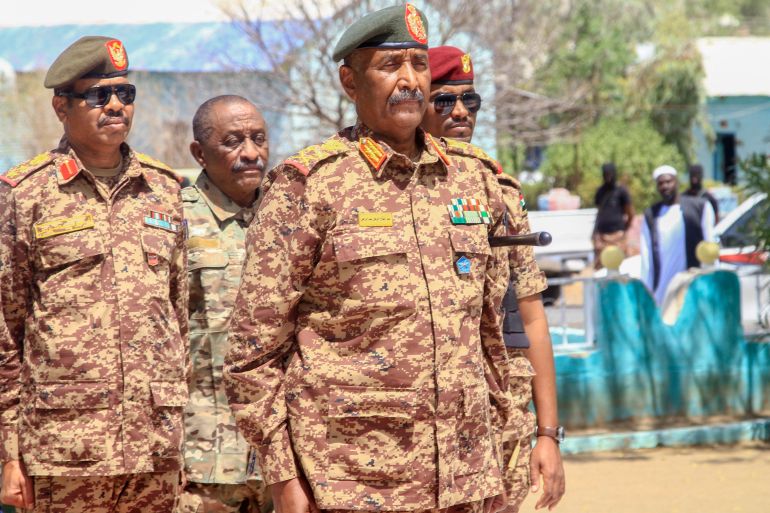Sudan army chief criticises Geneva talks, vows to continue fighting RSF
Abdel Fattah al-Burhan says US-backed peace negotiations in Swiss capital aimed to ‘whitewash’ RSF paramilitaries.
Sudan’s army chief Abdel Fattah al-Burhan visits casualties receiving treatment at a hospital in the southeastern Gedaref state [File: AFP]Published On 24 Aug 202424 Aug 2024
Sudan’s de facto ruler, army chief Abdel Fattah al-Burhan, has said his government would not join peace talks in Switzerland, saying the military would “fight for 100 years” if necessary to defeat the paramilitary Rapid Support Forces (RSF).
Burhan, who leads the governing Transitional Sovereignty Council, told reporters in Port Sudan on Saturday that the talks aim to “whitewash” the RSF and countries that support the paramilitaries.
Keep reading
list of 3 itemsend of list
“We will not put down our weapons as the rebellion continues. We will not co-exist with the rebels and we will not forgive them,” he said.
The United States opened talks in Switzerland on August 14, which concluded on Friday, aimed at easing the human suffering and achieving a lasting ceasefire.
Saudi Arabia, Egypt and the United Arab Emirates also acted as mediators in the talks, which aimed to secure more aid as Sudanese civilians face famine, mass displacement and disease.
While an RSF delegation showed up, the Sudanese Armed Forces (SAF), led by Burhan, were unhappy with the format and did not attend. But they were in telephone contact with the mediators.
“Though we were in consistent communication with SAF virtually, we regret their decision not to be present, and we believe that limited our ability to make more substantial progress towards key issues, particularly a national cessation of hostilities,” the mediators said in a statement on Friday.
The war in Sudan, which began last year, has led to one of the world’s worst humanitarian and displacement crises.
The Sudanese army and the RSF – under Mohamed Hamdan Dagalo, better known as “Hemedti” – have been vying for power and control of the African country of 46 million people.
Rights groups have called on both sides to avoid civilian harm and enable humanitarian access.
More than 25 million people are facing acute hunger across Sudan, according to the Integrated Food Security Phase Classification (IPC), a United Nations-backed body that monitors global hunger.
The war has also displaced more than 10 million people and triggered a public health disaster.
Last week, the warring parties agreed to improve access for humanitarian aid, with two routes identified to ensure the flow of resources to civilians, mediators said.
One was the Adre border crossing with Chad, which leads into the Darfur region. The other was along the Dabbah Road from Port Sudan on the Red Sea.
US Sudan envoy Tom Perriello told a press conference in Geneva on Friday: “We hope that this will be a source of momentum for much bigger steps and progress down the road.”
But he acknowledged that progress had been slow due to the absence of the SAF — and the results were inadequate to address the scale of the humanitarian crisis.
Moreover, overlapping efforts in pursuit of a ceasefire, including Saudi- and US-led talks in Jeddah, have not eased the fighting.
“We do believe that the national cessation of hostilities is possible. We know that that is going to take a great deal of work,” Perriello said.
In an interview with Al Jazeera on Friday, Cameron Hudson, a senior fellow for the Center for Strategic and International Studies in Washington, DC, said that the international community has failed to exert the necessary pressure to ensure decisive action in Sudan.
“These are two armies that are caught in a pitched, existential battle. The last thing that they’re interested in is respecting agreements that they don’t see themselves as parties to,” he said.
“So I think the only thing that’s going to change their outlook is if we bring real pressure to bear — if there are consequences for not showing up in Geneva.”
